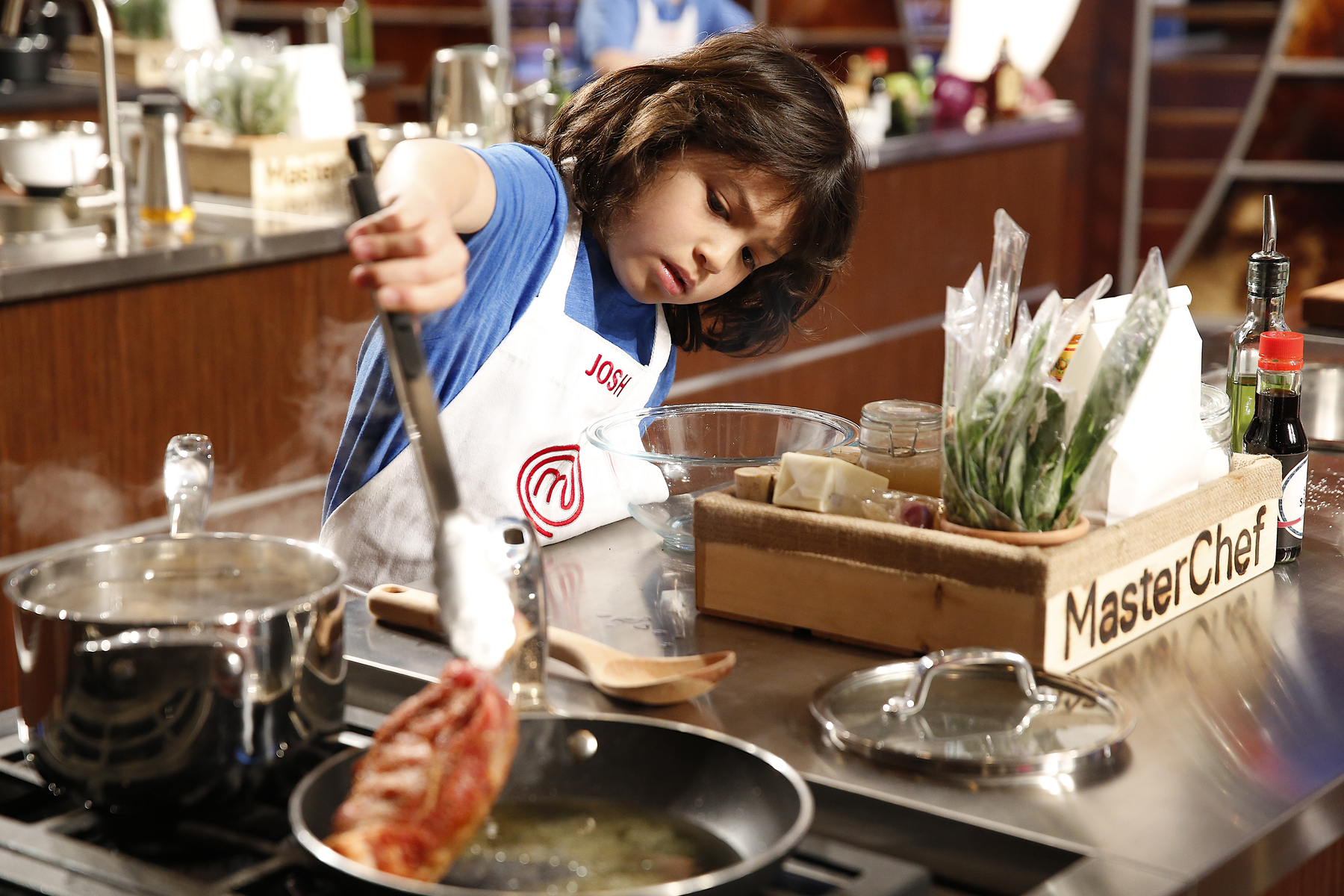
One of the first things I thought when I first heard about MasterChef Jr. last year was: Why would so many kids, as young as 8 years old, want so badly to work in the kitchen? (Corollary question: And how do I get my own kids to do it?)
The question, really, is: Why wouldn’t they? It appeals to nearly every desire a kid could have. Forget the simple fact that food is delicious. Cooking allows a kid competency and power on the same level as adults–really, if you look at our country’s meal habits, well beyond that of your average adult.
If you’re an adult, even if you don’t do it for a living, you probably regard cooking as a job. But what is it really? It’s science. It’s the study of the transformation of matter. You heat an egg and it becomes solid. You use a whisk to direct force onto cream and it whips into a cloud. You apply blazing heat to a meringue and it caramelizes into a luscious crust. You combine eggs and flour and water in one way and you get a spongy cake. You combine them a somewhat different way, and you get a dense, chewy pasta.
It’s also art: you add this flavor to this flavor to this flavor–there are no rules, you decide–and you get this other thing, a flavor that did not exist before. And it’s power. You are given control of a giant furnace. There are electric machines. There are knives. There is fire.
You put together science and power and art and what do you get? As a child, you cannot actually go to Hogwarts, but in the kitchen, you can perform something close to wizardry.
MasterChef Jr., which returns to Fox Nov. 4, is the most delightful, cathartic reality competition on TV because it lets you see contestants taking unsullied pleasure in what they can do. I mean, let’s be honest: these kids are not seasoned professional chefs. The dishes they put together in the first two episodes of the new season often look terrific and are probably beyond the ability of most of the grown audience, but they’re not, generally, at the level of difficulty or complexity you might encounter on the adult version of MasterChef or Top Chef.
(Deliciousness, that’s another matter. On the season premiere, a kid turns in a plate of simple but gorgeous glazed chicken wings, and judge Joe Bastianich praises him for “turning $1 worth of chicken into a $20 plate,” one of the purest distillations of the restaurant business I’ve heard on a reality show.)
But here are some other things you don’t have on MasterChef Jr. that you do on adult cooking competitions. Viciousness. Spite. Desperation.
Even on the most fun adult cooking competitions, there’s often a subtext of sadness and dire stakes, of the clock ticking: this person really needs to jump start a stalled career, that person has got to have that prize money to start a restaurant or it might be the end of the road.
That’s not necessarily the fault of the shows. That’s adulthood: a time when your life starts to get defined by what you’re good at and not, what you chose and did not choose, what you no longer have time to do. The things that you have to do start to encroach on the things you love to do. The premise of competition shows–that there is room only for so much success, and therefore others must fail–is just a heightened extension of all that.
MasterChef Jr., on the other hand, is about believing you can do a thing because you love it. There are broken hearts and tears; a young cook’s face collapses when she realizes that she served judge Gordon Ramsay a piece of undercooked chicken. Yet what happens next is wonderful: the kitchen full of competitors swarm around her, hugging and consoling and trying to convince her that, don’t worry, most of the dish was really good. (I am not the hardest TV watcher to make cry, I’ll admit, but MasterChef Jr. is the current reigning Daddy’s Cry Time show in my household; I misted up just typing that.)
OK, this is a reality show; I know it’s edited and dressed up to elicit a reaction. Am I romanticizing childhood in my old age? Sure. I have been to enough soccer games and had enough dodgeballs thrown at me to know how fiercely kids like to win. Maybe the show is sweetened a little, as it were, and maybe the judges’ praise is too, in comparison with their tough judgments on the adult version. Maybe everyone here–producers, judges, kids, the audience–is invested in creating a show where the young competitors look good and we feel good, and maybe we’re all working a little bit to make that happen.
But so what? Sue all of us. Because as the amazing kids in MasterChef Jr.‘s kitchen show us every week, putting in effort to create delight isn’t really work. It’s magic.
More Must-Reads from TIME
- Cybersecurity Experts Are Sounding the Alarm on DOGE
- Meet the 2025 Women of the Year
- The Harsh Truth About Disability Inclusion
- Why Do More Young Adults Have Cancer?
- Colman Domingo Leads With Radical Love
- How to Get Better at Doing Things Alone
- Michelle Zauner Stares Down the Darkness
Contact us at letters@time.com